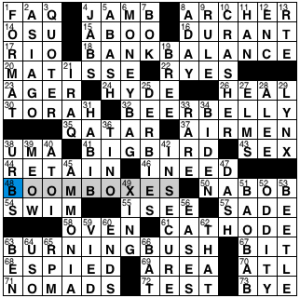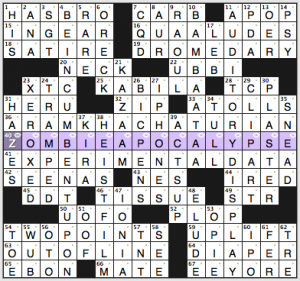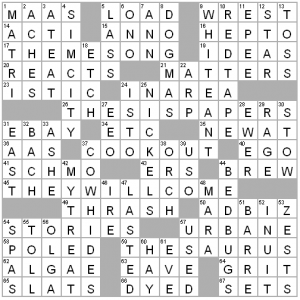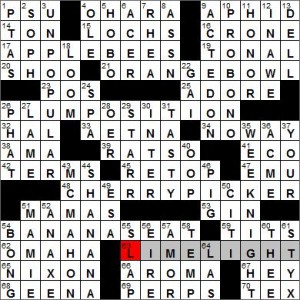NYT 2:52
Jonesin' untimed
CS 8:33 (Sam)
LAT 3:17 (Neville)
Andrew Marc Greene’s New York Times crossword
There are surely many other phrases that would fit this vowel progression theme, but the quintet Andrew has chosen are zippy enough. Had he used BOOGIE BOARD instead of BOOM BOXES, the BEER BELLY would have needed to be pluralized to balance the letter count, and isn’t one BEER BELLY enough for anyone?
- 18a. BANK BALANCE, bA— bA—.
- 32a. BEER BELLY, bE— bE—.
- 41a. BIG BIRD, bI— bI.
- 48a. BOOM BOXES, bO— bO—.
- 63a. BURNING BUSH, bU— bU—.
Nice touches:
- The NABOB/BAOBAB multi-B action that isn’t mandated by any crossings with theme answers. (Diplomat Philip HABIB‘s two B’s are both in theme answers, on the other hand.)
- The Middle Eastern U-less Q country crossing of IRAQ and QATAR.
- 70a. [Peach State capital: Abbr.], ATL. I was just there last weekend, and wow, a Georgia peach really, truly is worlds better than a peach from other regions.
- 52d. [Item fit for “Ripley’s Believe It or Not!”], ODDITY. How many of you devoured Ripley’s books and the feature in the Sunday comics? I sure did.
This simple and smooth puzzle closes out the grid with the word BYE, which is my cue. Four stars.
Matt Jones’s Jonesin’ crossword, “Sixteen Handles”
I don’t know what the title means, but the triple-stacked answers in the middle of this grid have 16 letters. Just as the speakers in This Is Spinal Tap went to 11, Matt goes to 16:
- 36a. [“The Sabre Dance” composer], ARAM KHACHATURIAN. That’s a name I learned from crosswords, generally with the last name consigned to the clue list.
- 40a. [Societal breakdown, as it were], ZOMBIE APOCALYPSE. Clearly the seed entry, right? That gruesome attack on the bridge in Miami helped popularize the phrase some more.
- 41a. [Scientists collect it], EXPERIMENTAL DATA. *stifled yawn*
And then there are the two 15s that form an H with the stack: BE INCUMBENT UPON is fine, and I’d never heard of AUDITORY DISPLAY but its clue, [Computer aid for the blind], is self-explanatory.
Other bright lights include QUAALUDES riding atop that DROMEDARY; the DIAPER clue, [Subject of the “cloth or plastic” debate]; two-X XEROXED; a middle pocket filled with BIC PENS and IPHONES; and a HEIST FILM such as [“Reservoir Dogs” or “Ocean’s Eleven”]. And of course, there’s cheesy KAZAAM, the [Shaq-as-genie movie]. Plus, from my childhood, I like UBBI, [First half of a secret language on “Zoom”]. Whubat dubo yubou mubean, yubou dubon’t rubemubembuber Ubbi Dubbi?
The things I had no idea about:
- 7d. [Maritime abbr. that predated SOS], CQD. I assume that means “come quickly, dear.” (Do not correct me if I’m wrong.)
- 37d. [___ Nerys (“Star Trek: Deep Space Nine” character)], KIRA. Who?
- 55d. [When repeated, derisive term for dubstep’s repetitive bass line], WUB. Sounds like half of a word in Ubbi Dubbi.
- 31a. [___-Ur (Egyptian sky god; hidden in CHERUBIC)], HERU. Thank the Matts for that “hidden in” helper.
In closing, do prepare for the zubombubie ubapubocubalubypse. Thrubee puboint subevuben-fubive stubars fubor Mubatt Jubones.
Randolph Ross’s CrosSynergy/Washington Post crossword, “Definite Article” – Sam Donaldson’s review
Fun idea for a theme! Randy takes four words that start with THE- and re-imagines them as two words starting with the definite article “the.” The problem here is in the lack of consistency in the execution. Let’s recap the theme entries to illustrate the inconsistencies:
- 17-Across: An ordinary “theme song” becomes THE ME SONG (three words), a [Tune for a diva?]. Great start. And the theme is apparent–“two-word terms that become three-word terms if you break the first word into two after THE.”
- 26-Across: Same thing here, as “thesis papers” become THE SIS PAPERS, [A sib’s published diaries?]. The only problem so far, from my perspective at least, is that I’m not sure “thesis papers” is an in-the-language term, and I’m reasonably sure I’ve written more than 95 theses over the years.
- 45-Across: Now here’s where the wheels come off, for now we take the terrific phrase from Field of Dreams, “they will come” and change it to THE Y WILL COME, or [What happens when you offer to build a new community rec center?]. The problem, you see, is that now we’re making three words into four, not two into three. Unless we get another theme entry that does the same thing, we have a nagging little inconsistency, which is too bad since both “they will come” and “the Y will come” are gold.
- 59-Across: Alas, we don’t. In fact, we get yet another new variation, as a “thesaurus” becomes THE SAURUS, [Roget’s reference to a T. Rex?]. Oops, there’s not one but two inconsistencies here. First, this is the only case where we’re making one word into two words (not two into three or even three into four). Second, this is the only theme entry with a clue that overtly references the unbroken original term (here through the mention of Roget). Yeah, you can argue that the diva’s “tune” is the diva’s “theme song,” but I can’t get over the feeling that something like [T. Rex’s nickname, to lesser dinos?] would have been more consistent with the other clues.
So the theme concept gets a solid five stars but I can’t give the collection of theme entries more than three stars. The fill is a solid four stars, though. It gets a little creepy-crawly with the WHITE ANT, the COWHIDES, and the BED BUGS, but you gotta love SIM CITY, MY TREAT, COOKOUT, and RED TAPE. What could have been a rather inelegant entry, IN AREA, is salvaged with a very elegant clue, [How California ranks #3]. There’s a small toll for all this juiciness, and it comes in the form of the suffix ISTIC, the prefix MATRI, the Crosswordese of ANNO, AAS, and EWER, plus the awkward POLED. But I’m willing to pay that price.
Favorite entry = BED BUGS, even though [They might bite at night] (the rhyme time is sublime!). Favorite clue = [“Mad Men” subject, in slang] for the AD BIZ. Between Mad Men and Breaking Bad, I’m not sure which is the best show on television these days. I’m glad I don’t have to decide and can enjoy them both!
Ed Sessa’s Los Angeles Times crossword – Neville’s review
PSU at 1a? Awkward… let’s see if the puzzle is a winner or if it’s going to be vacated.
- 17a. [Casual dining chain] – APPLEBEE’S
- 21a. [Annual Florida football game] – ORANGE BOWL
- 26a. [Nice work if you can get it] – PLUM POSITION
- 48a. [Truck with a bucket] – CHERRY PICKER
- 54a. [Elongated bike saddle] – BANANA SEAT
- 63a. [Celeb’s domain] – LIMELIGHT
So it ends up that we’ve got a real “Fruit of the LOOM” going on in the beginning of the theme entries… all six of them! All are well-known fruits and phrases; not a bad one in the bunch.
I like some long down entries: PRO BONO, WEEKNIGHT, MCMAHON and SHA NA NA. No need to get in a flame war over ACER vs. DELL products.
Look at this – crossing entries AMOR/AROMA make a palindrome! THere’s YOUR wordplay for this puzzle. I want to do something with [Small songbirds] – TITS, but I have a hunch that I’d be getting a handful of angry emails about it. I’ll leave it there.




BYE is also a nice close to the theme.
BYE-BYE would have been even cuter, perhaps, but this was a very elegant puzzle.
DUBSTEP! I’m curious, is this a word familiar to people not into the genre?
Yes — could have clued BYE as “When repeated, doubly-fitting final word for this puzzle”
Darn. If I’d noticed the vowel progression I’d have given it another star; it makes the theme a lot more coherent. I’ll second the call of “zippy choices”. Also love BAOBAB, such a fun word; at least in terms of odd African flora, it’s easier to put in a grid than say WELWITSCHIA!
Gareth,
So many weird and wonderful proteas have nicer names (and habits) than Welwitschia. Its Afrikaans name, TWEEBLAARKANNIEDOOD, would be good for a Sunday puzzle from hell.
(I had to look that up, of course, but came within 3 letters of correct from memory. Leucospermum cordifolium, a South African pincushion protea that I grow, is one of probably hundreds of Latin names of African flora that I can cite without references, but that’s a curse. I’d much rather be able to remember the names of my wife’s nieces and nephews. Elaine is used to my knowing the Latin name of every weed I’ve ever met but not the daughter of our best friends, but she’s not happy about it.)
I discovered baobabs in The Little Prince. It’s a very fond memory.
PS. The Afrikaans name for that very weird plant is a little easier to remember if you spot the cognates. It sounds like a Scot reciting its English meaning: “two leaves that cannot die.” So much of Dutch is like that too: say it out loud and it magically becomes English. The trick is to learn the pronunciation of the letters.
Nice Tuesday!
HABIB could have been clued as “beloved in Bahrain”, or IRAQ, QATAR and a whole slew of Arabic speaking places. If you ever listen to Arabic music, you’d hear “Ya HABIBi”, o my beloved, over and over. It can also be used more casually to mean “my dear”.
It feels to me as if B is less commonly used in English than in Arabic, where there’s no “P” sound (so Loren, Pee- ness would be pronounced Bee-ness). You can sometimes tell the age at which a native Arabic speaker acquired a foreign language based on whether or not they can make the P sound. So kids call their dads “Baba”. I was recently reading a book about a Chinese young man living in Japan during the 1930’s Japanese invasion of China, and was surprised to see that he called his father Baba.
Martin, I too learned BAOBAB from the Little Prince, along with Boa!
I’m glad people have picked up on BYE. It’s not duplicated because of Y’s hybrid status as both vowel and consonant. And I didn’t want to call attention to it; as I wrote to Deb for the Wordplay blog, I like puzzles that have a little something extra for the solver to discover. But it was definitely a theme answer in my mind.
Thanks for the nice feedback, all.
Martin: The best advice I ever received about Dutch is that if the word looks English, pronounce it as if it were German, and if it looks German, pronounce it as if it were English. A bit tongue in cheek, but useful.
I share your curse of not easily retaining people’s names yet having many scientific bi- and trinomials available for easy retrieval. Pet peeve: I dislike the practice of calling them “Latin names” since there is quite a lot of Greek among them, not to mention “classicized” (usually Latinized, admittedly) proper names and words from other languages. My preferred term is the no-nonsense scientific name.
Also liked the NYT. Amy, welcome back. Glad you had a good time in the magical land where every street is Peachtree Somehingorother.
I am not a major Trekkie, but Kira Nerys was one of my favorite characters. She was given a wonderfully complex persona by an actress I have otherwise never heard of, named Nana Visitor. She never took any crap from anyone, especially men, and she had perhaps the most amusingly complex range of sexual preferences ever encountered. If I recall correctly, in an episode which featured one of those parallel universes, (where everyone has their own counterpart), she fell in love with herself — by implication in a fully consummated relationship. How’s that for a plot twist!
If you want to hear a *really* rocking piano cadenza, which I think anyone who loves any hard edged, in-your-face music would enjoy, listen to the first movement of the Khachaturian piano concerto. There’s a page and a half of fortissimo, ever accelerating repeated descending chords, with narrow voice leading, creating shifting dissonances. One of the neatest pieces of heavy metal piano writing and virtuoso playing you will ever hear.
Bruce: That’s the current Matt Gaffney Weekly Crossword Contest. Joon will explain all in a little over two hours. (So you should probably redact your entry to remove spoilers until then…) [Edited to add: which you have now done. Thanks.]
Huda – Arabic has no p sound? Wow. I would have thought every language on the planet would have a p sound. Does it had a t and a k sound? I’ve never had a chance to look at Arabic. When you were studying history, were your time lines reversed, with the future on the left and the past on the right? And math equations – 5= 2+3?
Gareth – I didn’t notice the vowell progression until the blog either.
BAOBOB is a Jabberwocky-looking noun:
“So rested he by the BAOBOB tree. . .”
Andrew – I’m inexplicable really, really pleased that the BYE’s position wasn’t just serendipity. I need more hobbies.
OH> Andrew & everyone else–I’M SORRY ABOUT THAT. Didn’t realize. That’s the problem with no identification on the puzzle. I’ve picked the only solution which seemed to work to delete the comment, leaving one word intact, which I assume will not spoil.
Bruce, I’ve removed that one word in case anyone could suss out the meta answer from even that. (Though if they could, my hat is off to them!)
Loren, no P, no V (but people have no problem saying the latter) but pretty much everything else is there, including a few sounds most westerners cannot emit. All these Q’s without U beloved by constructors denote a K-like sound that comes with a very strong guttural stop, with the tongue rolled against the very back of the palate– a fatter, fuller sort of K.
There’s a deep A that comes from low in the throat and a sound like the French R except a little more pronounced, several types of deep H’s– all of it makes people think you’re clearing your throat :) In general, the back of the mouth is used more than the front, I’d say, and P and V are really up front.
I think what Arabic cannot do is modulate the frequency the way Chinese does (is that the way to describe it?)
Everything is written from right to left, timelines and arithmetic equations included, but Arabic and English numbers are similar in their sequence- so 312 is not written as 213, it’s in the same order as in English.
Add to all of this the fact that formal Arabic (whether in literature, Quran, newscasts, etc, shared by all Arabic speaking countries) can differ markedly from the colloquial which can vary from city to city. So, a kid is really learning multiple languages from the get go.
QUAALUDES/BAMBAATAA crossing was a little ??? for my taste, but I still thoroughly enjoyed the Jonesin’ puzzle. His triple stacks are always winners for me.
I can’t speak to Arabic, but Pashto speakers have a problem with Fs and Vs, so that “five” comes out “pibe”. There are some substitutions that would make you blush if you didn’t know what was going on but I’m sure my students felt the same way about my sorry attempts at the sounds usually transcribed as Q, KH and GH — which when I mispronounced them often came out as vulgarisms.
“They will come” isn’t anywhere in Field of Dreams. The phrase is “people will come.” There is also “if you build it, he will come.” I don’t think THEY WILL COME is a standalone phrase that can be punned off of, but maybe that’s just me.
Huda – Thanks for the info! Fascinating that you have a b but no p! No v, huh? How about an f? I knew that Arabic has a lot of stuff going on in the back of the throat. Maybe it’s easier to be a ventriloquist in Arabic? Interesting about the plethora of phonological action at the back of the mouth and dearth at the front! In America, those throat sounds are learned later than the front ones because the child can’t see what’s going on (I can still hear Celia Coker demanding me to “Det off my trampoline and det in de torner!”). I wonder if Arabic -learning tots end up mastering the phonology later than other language learners.
It’s been my experience with Japanese and German that there exists a “high” form that speakers can kindly switch to to be nice to foreigners, something akin to an person from the Ozarks eschewing his dialect and speaking like Walter Cronkite so that a non-native English speaker may understand him. Some of the dialects in Japan, Germany, Austria, and Switzerland are, to an untrained ear, utterly indiscernible from their “high” counterparts. I infer that “formal Arabic,”then, changes from place to place?
ethan, i think THEY WILL COME is as much, if not more, in-the-language as “people will come” or “he will come”, regardless of what the actual quote was. much like “beam me up, scotty” or “play it again, sam”, the misquote is more famous than the quote. that said, i had issues with the theme along the same lines as sam’s.
nice jonesin’ freestyle. some crazy entries, as usual, but QUAALUDES crossing afrika BAMBAATAA crossing ZOMBIE APOCALYPSE is worth the price of admission. and hey, don’t you yawn at EXPERIMENTAL DATA. where would you be without it? still in the thrall of
heliocentrismgeocentrism, caloric theory, animal magnetism, and intelligent design, probably.Jared,
I thought DUBSTEP was a type of dance rather than a musical genre. I posted this extraordinary dance performance (my initiation) on this site when the performance only had about a million hits. Now it is over 58-million. The music is dubstep; the dancing is surreal, but there are many excellent dance interpretations to dubstep.
http://www.youtube.com/watch?v=LXO-jKksQkM
Steve
@Joon, OK, the misquote “if you build it he will come” is well-known, but “they will come” BY ITSELF is in the language? I think not. I have seen FOD at least a dozen times and I would have had no idea what the pun was if not for Amy’s writeup.
Also, what’s weird about the misquote is that it actually changes what’s being said semantically. Unlike most such misquotes which involve changing word order or something, changing “he” to “they” completely ignores the premise of the movie, which is (spoilers) that the protagonist brings back his dead father.
Having not done that puzzle, I was glossing over the comments about movie quotes. Now that I’ve looked at it, I will agree with Ethan that a context-free THEY WILL COME, with no prefatory “if you build it,” is really not in the language. There’s no reference to Field of Dreams in the clue, or to movie quotes, so it’s just sort of hanging there wanly. (I will disagree with Ethan that my write-up explained the wordplay, since it was Sam’s write-up.)
Ripped from the headlines — or at least from James Holmes’ match.com profile:
Techno and electronic are great, none of that dub step wub wub wub though.
Thanks Steve, that was pretty great.
Martin, I’m happy enough to disagree with James Holmes.
Sorry, Amy! I just saw the part at the top that said “Posted by Amy Reynaldo.”